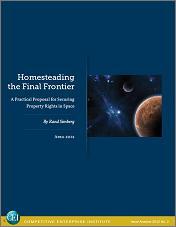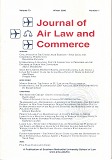Homesteading the Final Frontier: A Practical Proposal for Securing Property Rights in Space
by Rand Simberg
Rand Simberg, researcher at the Competitive Enterprise Institute (CEI) and author of the popular space blog Transterrestrial Musings has published a report on the viability of the lunar land claims recognition concept.
Click here or on the image at left to download the full paper in PDF format.
In this report, Homesteading the Final Frontier: A Practical Proposal for Securing Property Rights in Space, Simberg argues that space property rights are not only a necessity for space development. He says that recognition by governments (the U.S. government in particular) of property rights in space would create a powerful financial incentive for opening the space frontier.
A lunar land claims recognition law such as the Space Settlement Prize Act could enable the multi-billion dollar economic incentive that private industry needs to justify investing heavily in space infrastructure. Such a law would require the U.S. Government to legally "recognize" that any permanent, established, and privately owned space settlement financed by private money has the right to take legal ownership of the land around its base, whether on the Moon, Mars, an asteroid, or other celestial object.
Deeds to this land could then be sold back on Earth by the developers of the settlement, to recoup their initial investment and reap a signficant profit. Importantly, the law could be framed to not conflict with Article II of the 1967 Outer Space Treaty. That provision bans ownership of celestial land by nation states but not by private entities.
For a concise wrap-up of his arguments, here's his Executive Summary:
While new space transportation companies are driving down the cost of accessing space, development of the space frontier will continue to be held back, as it has for decades, by the lack of clear off-planet property rights. Without them, it is difficult to raise funds for extraterrestrial ventures, despite the abundant resources on the Moon and on asteroids, including metals with high value on Earth.
Many believe that the 1967 Outer Space Treaty implicitly prohibits private property in outer space, but under another conceivable interpretation, it only prohibits declarations of national sovereignty. A proposed law requiring the United States to recognize land claims off planet under specified conditions offers the possibility of legal, tradable land titles, allowing the land to be used as loan collateral or an asset to be sold to raise funds needed to develop it.
Such a law would vitiate the 1979 Moon Treaty, which does outlaw private property claims in space, but to which the U.S. is not a signatory. This should be viewed as a feature, rather than a bug. The law would not impose any new costs on the federal government, and would likely generate significant tax revenue through title transaction fees and economic growth from new space ventures carried out by U.S. individuals and corporations. It would have great potential to kick the development of extraterrestrial resources - and perhaps even the human settlement of space - into high gear.
Simberg backs up his proposal with over 50 detailed references, listed at the end of the report.
UPDATE. On April 5, 2012, this proposal was presented at a press conference on Capitol Hill. The author, Rand Simberg, debated it with another speaker Jim Dunstan.
Some essential arguments not fully addressed during the debate are covered in more detail in the following FAQs:
FAQ #36: Could this law force the US to recognize a foreign government's Lunar land claim?
FAQ #38: Would Article VI of the Outer Space Treaty prohibit Lunar land claims recognition?
Back from Homesteading the Final Frontier to Institute Home Page





